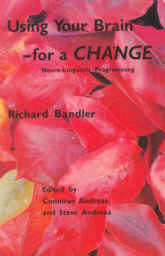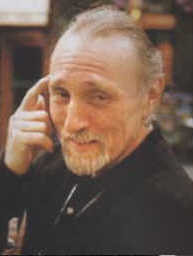This book was published about eight years after I introduced Steve and Connie Rae Andreas to
the work of Bandler and Grinder in the fall of 1977. After that, as they say in their introduction,
"we set aside most of what we were doing in order to study these exciting and rapid new ways of
changing behavior." And yet change does not come easily due to the entrenchment of current
practitioners in their fields. They quote Salvador Minuchin as saying:
[page 4] "How did people respond to our (research) findings? By defending their
own paradigms. In response to new knowledge, there is always the question of
how to maintain oneself doing the things one was trained in."
Consider that most of the people who attended Bandler's seminars were people entrenched in
their own paradigms and you can get a new meaning out of the title of this book created from
transcripts of Bandler workshops. He was talking directly to the therapists, telling them to take off
their hoary paradigmatic straitjackets and use their brain, both for a change of pace (they might learn
something new) and for producing a change in their clients (they might learn something new).
To avoid the resistance of the therapists, Bandler would tell a joke and then make a point right
away so the point would slip under the radar of the therapists's paradigmatic defense shield. The book
opens with an example of this technique, one that I personally experienced Bandler using over and
over again. Sometimes my sides would be aching from laughing and my brain wondering at what
wonderful changes he had slipped in under my radar.
[page 7] Neuro-Linguistic Programming is a word that I made up to avoid having
to be specialized in one field or the other. [ The joke - it probably elicited a belly
laugh from the specialists in the room sitting on their tight little paradigms. ] . . .
Although lots of psychologists and social workers use NLP to do what they call
"therapy," I think it's more appropriate to describe NLP as an educational
process. Basically we're developing ways to teach people how to use their own
brains.
To teach people how to use their brains in a good way, it's useful to start by teaching them how
they already use their brains in a bad way. People think they would like to have a photographic memory.
Yet they come back from a horror movie, and every time they think about the movie they are back in their
seats in the movie getting scared all over again. One process that everyone understands, but many use
backwards, up until now. And not only for bad stuff that's already happened, as Bandler goes on, people
also use that process when they think of bad stuff that hasn't happened yet and feel bad. Bundled up in
those couple of sentences are concepts that could drastically improve the quality of people's lives, if they
were to work on understanding how to apply those concepts in their everyday and workday lives.
[page 15] Another difficulty with most psychology is that it studies broken people to
find out how to fix them. That's like studying all the cars in a junkyard to figure out
how to make cars run better.
This whole business of fixing people seemed to me a little backwards - instead of fixing things
that are broken, I thought, why not break things that work in people's life to give them results they don't
like. Probably an idea that Bandler first implanted in my brain while I was laughing. So I told people, "I
don't fix people, I break them." Here's an example of how that kind of thinking might work.
[page 17] I've always thought John Rosen's approach to psychosis was the most
useful: enter the psychotic's reality and then spoil it for him.
"That sounds like a risky endeavor," some of you may be thinking and perhaps Bandler would
agree, now that he's actually tried it. It was reported to me that Bandler entered a room with a psychotic
and a woman. The woman was shot and Bandler was indicted and tried for her murder. He was acquitted,
but it certainly demonstrates the dangerous nature of entering a psychotic's reality. There is a strong
element of truth to the statement that if we wish to understand another person we must enter their reality.
If we manage this feat and then "spoil it for him" we may be said to have broken him, and for the better,
for a change.
On page 26 Bandler gives an example of a woman having a great time at a party for three hours,
who, just as she's ready to leave, spills coffee on her dress. Does she say, "Oh, well, I had a great time
and was ready to go anyway." - no, she says, "Oh, now the whole evening is ruined!" This process
happens in divorce cases commonly: eleven years of happy marriage, then a divorce and suddenly the
marriage is labeled "a failure." I've been married three times, once for eleven years, once for five years,
and now for over 23 years - to me that's like hitting a single, a double and a grand slam home run in one
baseball game! I tell people I consider myself a "three-time winner" and I mean it. I had three happy
marriages; some lasted longer than others. Something else that Bandler probably slipped into my brain
while I was cataleptic from laughter in one of his seminars.
In the chapter on Point of View, Bandler covers something that few people give much thought to,
but can make a dramatic change in their lives: the point of view from which they view the world when
they have a memory. You have two choices: associated - you view the world from inside your body
looking out of your own eyes, and dissociated - you view the world from outside your body looking at
yourself from a distance.
[page 41] When you recall a memory associated, you reexperience the original
feeling response that you had at the time. When you recall a memory dissociated, you
can see yourself having those original feelings in the picture, but without feeling
them in your body.
Why would this be important? Well, if you're interviewing a rape victim and need information,
which process would you want to suggest as a way for the victim to recover information in calm, rational
fashion? Certainly not the associated state where all the original feelings will arise. These two processes
of memory are important in phobia and grief work for therapists. A person with a phobia sees themselves
in a frightening situation in an associated fashion. A person with grief sees themselves with a loved one
who has died in a dissociated fashion. If you could teach the phobic the grief process, they would always
see the frightening situation from outside their body and not be frightened anymore. The grieving person
would see themselves in an associated fashion being with their departed loved one and would feel all the
good feelings of when the events of the memory actually happened. Again this important insight came to
me during some state of consciousness during a Bandler seminar.
If you can get to a Bandler seminar, do so. The next best thing would be to use your brain for a
change and read this book.
---------------------------- Reference Links for Bandler and Grinder ---------------
Reference Links to Material on Bandler and Grinder
written by Bobby Matherne
http://www.doyletics.com/arj/bnglinks.htm
~^~
Any questions about this review, Contact: Bobby Matherne
~~~~~~~~~~~~~~~~~~~~~~~~~~~~~~~~~~~~~~~~~~~~~~~~~~~~~~~~~~

 == == == == == == == == == == == == == == == ==
== == == == == == == == == == == == == == == ==
22+ Million Good Readers have Liked Us
22,454,155
as of November 7, 2019
Mo-to-Date Daily Ave 5,528
Readers
For Monthly DIGESTWORLD Email Reminder:
Subscribe! You'll Like Us, Too!
== == == == == == == == == == == == == == == ==
Click Left Photo for List of All ARJ2 Reviews Click Right Bookcover for Next Review in List
Did you Enjoy this Webpage?
Subscribe to the Good Mountain Press Digest: Click Here!


CLICK ON FLAGS TO OPEN OUR FIRST-AID KIT.
All the tools you need for a simple Speed Trace IN ONE PLACE. Do you feel like you're swimming against a strong current in your life? Are you fearful? Are you seeing red? Very angry? Anxious? Feel down or upset by everyday occurrences? Plagued by chronic discomforts like migraine headaches? Have seasickness on cruises? Have butterflies when you get up to speak? Learn to use this simple 21st Century memory technique. Remove these unwanted physical body states, and even more, without surgery, drugs, or psychotherapy, and best of all: without charge to you.
Simply CLICK AND OPEN the
FIRST-AID KIT.

Counselor? Visit the Counselor's Corner for Suggestions on Incorporating Doyletics in Your Work.

All material on this webpage Copyright 2019 by Bobby Matherne





